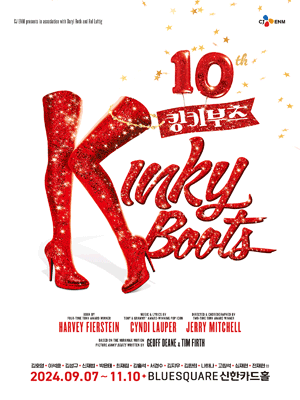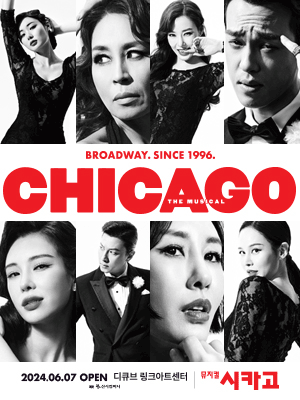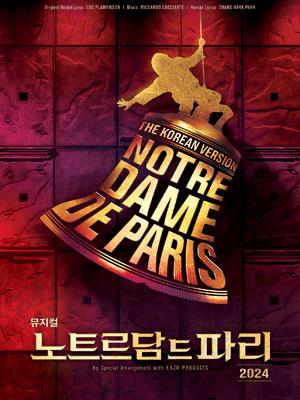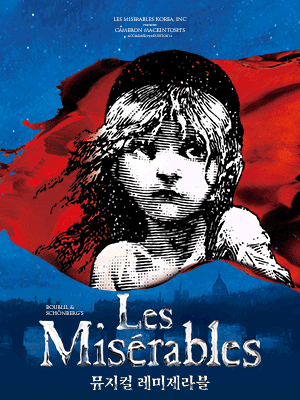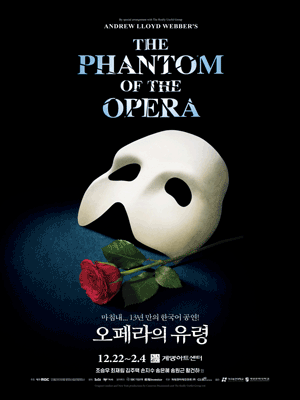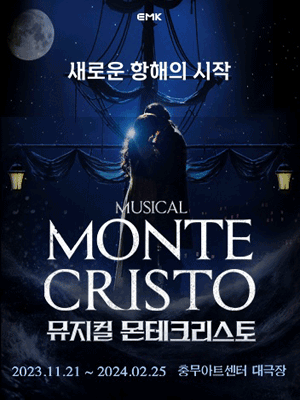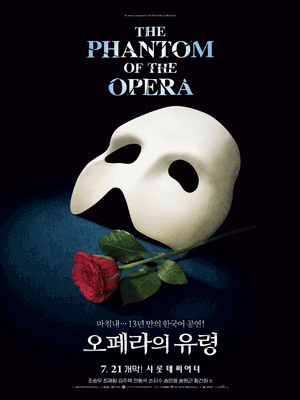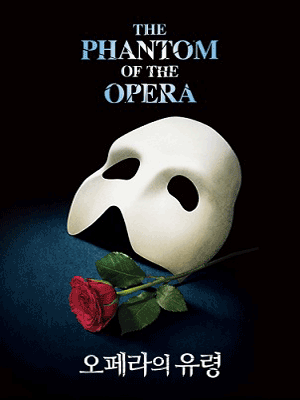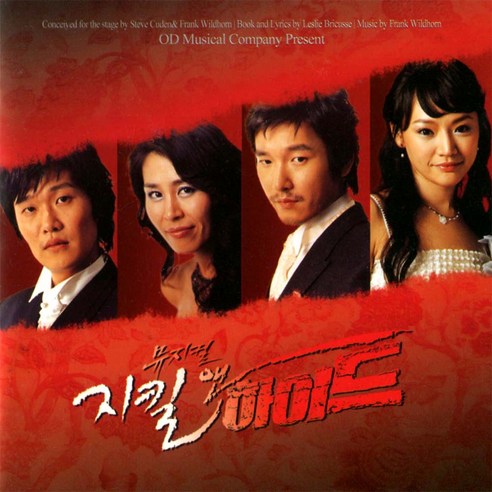top of page
Licensed Musicals in Korea
The licensed musical scene in Korea has seen tremendous growth, with high-quality productions featuring innovative staging, skilled casts, and exceptional vocal performances. Popular productions such as The Phantom of the Opera, Les Misérables, and Wicked have enjoyed successful runs, drawing large audiences and setting records in ticket sales.
This page provides a list of licensed musicals that have been performed in Korea, showcasing the diversity and quality of productions that continue to captivate audiences across the country.
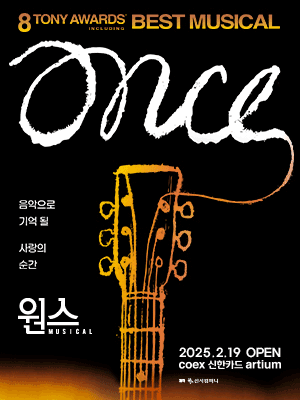
Once
I went to the show in May 2025 in Korea. I liked the simple Irish bar stage with lots of old, dusty frames on the wall, just like a real Irish pub. I thought they could have hung cups and kettles from the ceiling to enhance the atmosphere, but I guessed the Korean licensed production followed the original set.
Thirty minutes before the show, the stage pub entertained the audience, who could buy drinks like at a real bar. Ten minutes before the show, the actors started playing guitar, violin, viola, mandolin, accordion, cajón, piano, and more. They sang in a language unfamiliar to me — probably Czech. The engaging folk music made heavy use of foot stomping, raising the atmosphere to prepare for the show, which started seamlessly with an older actor’s solo followed by the Guy’s lament about his girlfriend leaving for New York. I noticed the hall’s acoustics were very dry with little reverb. At first, I couldn’t catch the lyrics clearly and had to concentrate more. The sound itself was clear, almost like voices and accompaniment without amplification. With about a 1,000-seat theater, it was a good choice not to amplify too much, but a slight increase in volume would have been better. Reverb and volume increased effectively when the Guy sang into a standing microphone, probably to emphasize moments like a broadcast or club performance within the musical.
Somewhere in the middle, I saw a ukulele cutely played in the background and heard a pipe-like resonance. I kept looking for a pipe instrument, but it turned out to be a banjo, according to my friend ChatGPT, which provided a deeper dimension to the band’s color.
The Girl’s accent, as a Czech character, was marked by a foreigner’s Korean. When she was supposed to speak Czech, she used perfect Korean pronunciation. The other roles followed a similar approach to distinguish their "English" and "Czech," though both were spoken in Korean. When mimicking English, the Girl had humorous dialogue and enunciated differently from the original punctuation, adding more energy to the lines. I think the translation team did a very good job, though "Falling Slowly" sounded unnatural with Korean lyrics — unavoidably different from the Grammy-winning song’s original words. Still, it was good when the Guy and Girl sang it, followed by the other actors joining in with instruments.
The Girl’s determination and firm belief that the Guy’s music would succeed commercially was beautiful, though I admit I wouldn’t be brave enough to invest in an almost stranger so easily. I must be a coward. Since the musical is light-hearted and optimistic, even the bank loan manager — who pretended to be a bad singer — played the guitar beautifully, earning big applause from the audience. I liked this scene a lot. The Girl’s speech about Ireland — a small island in the Atlantic Ocean with a strong cultural heritage including writers like W. B. Yeats, Samuel Beckett, James Joyce, and Oscar Wilde — was formidable. Bono was mentioned earlier in the musical, but besides him, Ireland also has Sinéad O'Connor, Van Morrison, Hozier, and more! I could have given a standing ovation right there.
In Act II, an argument between the pub owner and the banker led the Guy and Girl to a nearby hill. The Guy shared his childhood memories of his mother encouraging him to step into the world to accomplish something. The Girl talked about her husband, who had left her and their daughter in Dublin to return to the Czech Republic. The Guy’s feelings grew clearer, while the Girl confessed her emotions in Czech but kept them hidden otherwise.
"When Your Mind’s Made Up" brought a surge of energy to the scene. The engineer, who had been quietly observing, finally gave an approving nod. It reminded me of the subtle smile from the movie’s engineer — a small gesture, but one that carried great weight. In that moment, it became clear that the Girl’s belief in the Guy’s music had been right all along. His passion and persistence had paid off, and together, they had created something worth noticing. The entire band seemed to sense the breakthrough, their performance gaining confidence and momentum.
Eventually, the stage left the Girl alone, playing the piano and repeating a song with changed lyrics that signaled the approaching end of their relationship — that never even fully began. The Guy listened to her song and asked her to come to New York, but she refused. She was married with a child and wanted to give her husband a second chance. The Guy, aware of his growing love for her but uncertain if his feelings for his ex-girlfriend had fully ended, accepted the reality. This might be a small plot obstacle in typical musicals, but in real life, it would lead to lawsuits and complications. The story either reflects real-life struggles or shows that their attraction wasn’t strong enough to forget reality — or perhaps they were too mature to ignore it. Either way, it leaves lingering thoughts of what might have been, which is exactly the lasting impression the story needs.
The show ended with a duet reprise of "Falling Slowly," with the two singing on the same stage but now likely in different cities — the Guy in New York and the Girl in Dublin with her new piano.
I have Dublin in my heart. I had chances to visit the city for work. Its low, well-preserved buildings contrast with the taller Guinness building. I wandered among pubs at Temple Bar, intending to have just one pint in each. At the third pub, I met a married Irish couple who asked me to join them. My mission was incomplete, but I experienced Irish hospitality. My colleagues once visited the guitar shop from the Once movie and even bought guitars as souvenirs — perhaps too large to carry easily. This personal nostalgia added warmth to my experience of the musical.
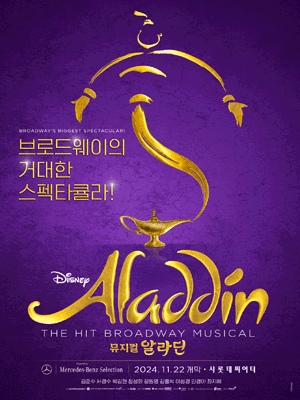
Aladdin
I attended the Korean production of "Aladdin" for two reasons: first, to write a comparison review, and second, to give my younger son a chance to watch the show. I had already seen the Broadway version with my older son, who has a mechanical mind, whereas my younger son has good musical ears.
The cast I saw included Kyungsu Seo as Aladdin, Kang Hong Seok as Genie, and Kyoungah Min as Jasmine.
The initial set design looked similar to Broadway. The stealing sequence felt natural, with Aladdin singing comfortably when the songs stayed melodic. I realized that "One Jump Ahead" and "Proud of Your Boy" feature many mid-range notes with small variations. Aladdin followed the melody, but his pitch was sometimes unstable. This is a common challenge for tenors, especially when melodies sit in the midrange where speaking and singing overlap. Interestingly, I had heard this actor perform different songs online with good results, suggesting that the demands of live musical theater, especially in this range, posed particular challenges in this performance. While occasional vocal difficulties are understandable, they did affect the overall impact of his songs.
When Jasmine sang "These Palace Walls," I was relieved to hear a well-sung and stable performance.
The phrase "Diamond in the Rough" was translated as "흙 속의 다이아몬드" (diamond buried in clay or soil). While this conveys a similar meaning, it suggests a diamond that only needs brushing off to become valuable. In contrast, the original phrase refers to an uncut diamond that requires grinding and polishing — a deeper metaphor for Aladdin’s potential. "다이아몬드 원석" (uncut diamond) might have captured that nuance more closely and would also have worked well rhythmically in the lyrics. Since this phrase recurs as an important theme throughout the show, I thought a more precise translation could have preserved the original meaning better. Additionally, the fricative ending of "rough" in English and the plosive ending of "석" in Korean provide a surprisingly good match in spoken delivery, maintaining both the metaphorical meaning and the theatrical impact.
Aladdin’s three friends were strong actors and singers.
The entrance to the cave was displayed on a curtain — understandable, considering the relatively short (seven months) run. When the curtain opened, the cave entrance appeared at the back of the stage, with multiple treasure towers placed in front. On Broadway, the outside entrance — black with beaming eyes — transformed into the inside seamlessly with a brief blackout, changing to a grey-toned interior through simple lighting adjustments. Without movable rails to bring the treasure towers in, it may have been difficult in this production to shift the sets quickly enough, making the curtain necessary. Still, I wondered if clever light dimming could have preserved the original stage flow.
Another disappointment was seeing Genie enter from backstage rather than jumping up from underneath, as in the Broadway version. Apparently, there were no elevating mechanisms in this production. Actors often appeared or disappeared behind curtained boxes or large props, which felt a little clumsy.
When Genie spoke and sang, I noticed his vocal condition was not good at first. It improved as the show went on, but during ensemble numbers, his voice still did not come through clearly. However, Kang Hong Seok’s acting skills carried the performance. His almost one-man show lasting about 20 minutes had the audience laughing, even though he shared the stage with the chorus and dancers during this time.
Like the Broadway version, Genie demonstrated examples of wishes behind three doors. One was a Signiel Apartment (priced around 10 to 20 million US dollars), which earned the biggest applause from the audience.
Jafar and Iago formed a good comic pair, much like on Broadway. The translation for their scenes was quite good.
By the end of Act I, my son commented, "The songs made me uncomfortable before Jasmine sang." I had to agree. Act I heavily features Aladdin’s songs in the beginning and Genie’s later, with only small parts for other characters, including Jasmine. With unstable vocals from the main leads, the act lost much of its emotional impact.
Act II began with the arrival of Prince Ali of Ababwa, and Genie’s voice sounded much better by then. The magic carpet ride looked similar to Broadway’s staging. Jasmine’s voice had beautiful resonance, perfectly suited for the role — I only wished she had more songs to showcase her talents.
Throughout the second act, I kept missing the elevating mechanisms when I saw actors disappear behind large props. For Jafar’s disappearance, a box was placed behind him instead of a dramatic descent. Nevertheless, the dances and choral work were strong, and Aladdin’s friends continued to impress with convincing acting and good singing voices.
I understand that elaborate stage mechanics can be costly, especially for a shorter run. Broadway likely benefits from standardized touring routines. However, I noticed some vocal instability among the main actors, which affected the overall impact of the performance. While occasional off-days are inevitable in live theater, I believe the music director and producer could take a more active role in supporting the performers and addressing recurring challenges. The multicasting system without flexible understudies also makes it difficult to adjust casting at short notice. Regularly reviewing performance recordings could help identify and resolve issues early.
Broadway is not perfect — no human effort is — and sometimes Korean productions can even surpass Broadway by focusing on the simple principles of good singing, good acting, and good production.
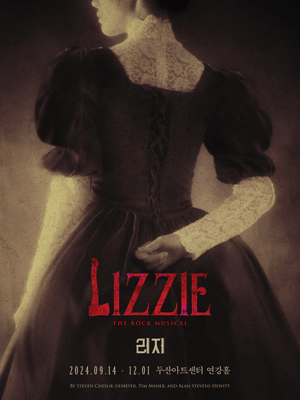
Lizzie
Lizzie is a rock musical inspired by the infamous 1892 double murder in Fall River, Massachusetts, where Andrew Borden and his wife Abby were found brutally killed in their home. Their daughter, Lizzie Borden, was arrested, tried, and ultimately acquitted — but she remained a central figure in one of America’s most enduring unsolved cases.
The musical reimagines the events surrounding the murders through a modern, feminist lens, blending historical fact with theatrical speculation. The cast features four women portraying Lizzie; her elder sister, Emma; the family maid, Bridget; and her close friend and confidante, Alice Russell.
Lizzie lives under the oppressive rule of her controlling father and emotionally distant stepmother. Victorian social expectations trap her in a life of obedience and denial. The musical introduces themes of psychological abuse and hints at the possibility of sexual exploitation by her father, an element not proven historically but often explored in modern interpretations.
Lizzie’s longing for freedom is symbolized by the birds she kept in the family barn. Just months before the murders, her father killed all of Lizzie’s pigeons with a hatchet — an act widely interpreted as a key psychological trigger in both the musical and popular accounts of the case.
As tensions rise, Lizzie finds comfort and possibly romantic connection with Alice Russell. Sisterhood, repression, class struggles, and the longing for agency all collide as Lizzie’s desperation grows.
The murders themselves are staged with theatrical ambiguity — they may be coldly calculated or a sudden burst of rage, depending on each production’s interpretation. Act II chronicles Lizzie’s trial and ultimate acquittal but leaves open the question of her guilt.
Driven by a raw, rock-infused score, Lizzie explores female rage, oppression, trauma, and the longing for liberation. The story blurs the lines between victim and villain, leaving audiences to ponder justice, survival, and the cost of freedom.
I attended Lizzie with my son in October 2024, and we both thoroughly enjoyed the show. The cast featured Sophie Kim (김소향) as Lizzie, Yeoeun (여은) as Emma, Yoo Yeon-jung (유연정) as Alice, and Lee Young Mi (이영미) as Bridget. When we received our tickets, we were also given small fluorescent axes to wave during the curtain call sing-along — a fun, immersive touch.
The stage was designed for both concert performance and musical theater. Set pieces glided or descended smoothly, clearing the central space for crucial scenes where the actors remained fully in focus. The story itself was familiar to me from true-crime TV programs about infamous American criminals. It is a deeply disturbing tale, one that suggests a profound family conflict beyond mere financial motives, assuming Lizzie Borden truly did murder her father and stepmother.
In the prologue, the cast sang “Forty Whacks,” beginning with cheerful, almost playful voices that soon darkened. Lizzie, initially seen on trial, quickly transported the audience back to the events leading up to the crime. She was clearly portrayed as a repressed and abused young woman with no one to confide in. Her solo number “This Is Not Love,” with choreography suggesting sexual abuse, made this repression painfully clear.
As the story progressed, Lizzie formed a bond with her neighbor Alice Russell. Lizzie’s “I Gotta Get Outta Here” and Alice’s “If You Knew” revealed the deepening connection between them.
In “Sweet Little Sister,” Emma Borden, dressed in a black Victorian gown, began the song seated on the back of a couch, microphone in hand. She passed the mic to a frightened Lizzie, who suddenly belted out her rage. The two sisters traded the mic throughout the number, the heat of their performance building until the audience could feel their anger and desperation. It was one of the evening’s most memorable songs. Eventually, Emma left the house, unwilling to remain with their father and stepmother, leaving Lizzie alone and vulnerable.
Bridget’s deep voice introduced “Shattercane and Velvet Grass,” a duet with Lizzie describing various poisons. Emma’s departure heightened Lizzie’s isolation, and when Alice visited, she and Lizzie spent the night together in the barn.
In the musical, the killing of Lizzie’s pigeons was portrayed as a possible psychological trigger for her eventual breakdown. The pivotal moment came when Andrew Borden, though never seen onstage, killed the pigeons Lizzie had cared for — a cruel act that symbolized her loss of control. Lizzie’s “Why Are All These Heads Off” expressed her mental unraveling in a powerful rock number accompanied by synchronized LED visuals. Sophie Kim’s scratchy rock vocals blended with Yoo Yeon-jung’s clear tone as Alice, creating a striking sound.
In a chilling scene, Lizzie — prohibited from entering the barn by her father — shattered completely. The audience witnessed the back view of Lizzie swinging the axe repeatedly — the infamous “forty whacks” — as her dress became stained with blood.
Act II saw Lizzie in a black leather costume leading “The Fall of the House of Borden.” During “Questions, Questions,” Lizzie, Emma, and Bridget wore modern black costumes, while Alice retained her Victorian dress, visually marking her inner conflict. Although Alice vowed to testify truthfully, she ultimately lied under oath to protect Lizzie.
The musical concluded with Lizzie’s acquittal and Bridget’s departure from the Borden household.
But the real finale came after the story ended. In full leather or vinyl costumes, hair down, the cast launched into a high-energy rock concert medley of the show’s key numbers. Many audience members were repeat viewers who sang along enthusiastically. Since it was my son’s and my first time, we couldn’t sing every word, but we joined in where we could and thoroughly enjoyed the atmosphere. Some lyrics remained in English, but I thought translating them into Korean was a wise choice, as words like “whacks” and “questions” would be difficult to pronounce clearly.
Sophie Kim delivered a vocally powerful and emotionally nuanced performance, portraying Lizzie’s progression from suppressed obedience to unhinged fury. Yeoeun’s Emma projected independence with a coarser rock tone. Yoo Yeon-jung’s clear, soft vocals captured Alice’s forbidden love and internal struggle, and she truly shone during the curtain call. Lee Young Mi was astonishing — as Bridget, she embodied a dark, Victorian figure with a strong rock voice, and during the curtain call, she transformed into the most authentic female rocker onstage.
All four performers were strong and fearless, embracing the musical’s dark themes and then transitioning into joyous exuberance for the finale, sharing their energy with the audience.
Korea is blessed with a rich variety of musical genres, and this production reminded me that female-fronted rock is one of its hidden strengths.

Dear Evan Hansen
Dear Evan Hansen is one of the few musicals whose core themes can resonate anywhere in the world. Social media, school bullying, and the moral complexity of lies told for acceptance are challenges of the 21st century — regardless of country.
The Korean production followed the original staging faithfully, using multiple monitors layered around the stage to create a constantly shifting canvas for backgrounds, newsfeeds, and the overwhelming noise of social media. Even the main curtain — designed as a blank laptop page — prepared the audience for a story shaped by technology, anxiety, and a desperate search for connection.
Though Evan’s story is simple, it is deeply uncomfortable. His well-meaning lie spirals into a narrative that hurts as much as it heals. That discomfort, while essential, leaves some wondering whether the plot could have found a way to preserve Evan’s moral integrity. In Korea, Park Kang-hyun’s Evan was portrayed with Asperger-like traits — a choice that made Evan’s poor judgment feel less like selfishness and more like a genuine social misstep. It was a small but significant adaptation that made the character’s actions more understandable and sympathetic to the audience.
Park Kang-hyun’s Evan was, without question, the best performance I have seen from him. In previous musicals, I occasionally noticed slight pitch inconsistencies, but as Evan he was flawless — pitch-perfect, emotionally resonant, and fully immersed in character. His vocal clarity and resonance filled the theater. He navigated falsetto and chest voice transitions with technical mastery. Particularly impressive was his ability to simulate crying while singing without losing pitch or projection — and, on occasion, to truly cry while maintaining vocal control.
His physical acting — the lopsided shoulder, the nervous posture, the subtle gestures — erased Park Kang-hyun from the stage. What remained was Evan Hansen. By the final performance, this transformation was complete. I no longer saw an actor performing. I saw Evan.
"Waving Through a Window" began gently but exploded in its reprise, a thrilling arc that carried all the way to the third balcony. "For Forever" reminded me of when Park sang it in English with his Miraclass members during a YouTube live broadcast. The original English rhyme structure adds a unique musicality, which he preserved beautifully. The Korean lyrics were surprisingly well-adapted — no easy feat, given the complex, modern social themes. However, repeating phrases like "for forever" could not be fully retained in translation. This challenge became especially clear when comparing his English performance to the Korean version. In the musical, I almost stopped noticing whether the lyrics rhymed at all — the beauty of his singing transcended the need for rhyme.
"If I Could Tell Her" featured breathtaking shifts in vocal color, with precise pitch and diction. It was in this number that Park fully disappeared into character. "Words Fail" was the evening’s emotional peak. Park’s slightly torn falsetto and the restraint he showed — holding back tears while letting the emotion flood the vocals — moved not just me but the entire audience. Even after the scene transitioned, I remained emotionally anchored to that song.
The final scene’s unexpected apple tree was a brilliant staging choice, symbolizing hope and growth amidst the aftermath of difficult truths.
The supporting cast brought authenticity and depth. Connor Murphy, Jared Kleinman, and Alana Beck felt convincingly like high school students, with believable physicality and emotional range. Zoe Murphy’s casting was the production’s only notable weakness. Both actresses struggled with pitch accuracy and favored darker vocal tones that, while perhaps appropriate for the character, didn’t fully connect for me.
The mothers were excellently cast. Both actresses portrayed parental exhaustion and the helplessness of adults watching their children struggle. Each mother expressed her care in a distinct way, though it was clear that Heidi Hansen was also struggling to balance work, study, and parenting alone. She had sent Evan to a therapist and encouraged him to write the letter beginning "Dear Evan Hansen," which inadvertently set the entire story in motion. In doing so, she seemed to hide behind the guidance of specialists, avoiding direct confrontation with the deeper problems — as many parents understandably do when overwhelmed.
Yet "So Big/So Small" became the first true moment of connection, acknowledgment, forgiveness, and acceptance between mother and son. It also marked the moment when Heidi embraced the reality of their family — no longer defined by absence (a missing father figure), but realizing that love and understanding are what truly make a family whole, not traditional roles. Though portrayed by two different actresses across performances, the role consistently conveyed how parents in similar situations can carry different emotional weights, yet arrive at a shared understanding of what it means to be a parent.
Larry Murphy didn’t sing as strongly but acted with quiet authority. Both actors brought warmth to the role, creating a father figure who, in another life, might have saved Connor from isolation.
One element that remains challenging — in any production — is the moral discomfort at the heart of Evan’s story. The narrative requires the audience to sympathize with a protagonist whose lie causes pain as well as healing. While this complexity is part of what makes the musical impactful, I still wonder whether future adaptations might find a way to ease this discomfort, especially for younger audiences who may struggle to separate empathy from approval. If the script could evolve slightly, Dear Evan Hansen has the potential to become not just a contemporary success but a timeless legend in musical theater history.
Dear Evan Hansen presented one of the most vocally and emotionally demanding roles I have seen Park Kang-hyun undertake — and he surpassed every expectation. He was not merely acting. He became Evan Hansen. For me, as a listener and reviewer, this was not just a highlight of Park’s career. It was a reminder of why musical theater matters — to reflect our struggles, to move us to tears, and to let us believe that even imperfect people can find connection and redemption.

Memphis
Years ago, during a business trip to Memphis, Tennessee, I ventured to Beale Street late at night in a rental car. Despite accurate navigation, the bright, bustling street was nowhere to be found. After circling the area several times, I asked a parked police car for help. The officer offered assistance, leading the way. At the entrance, he gestured to stop and advised placing all bags in the trunk to prevent theft. That night, Beale Street revealed its neon lights and the rhythmic pulse of blues and jazz. A visit to the famous B.B. King’s Blues Club followed. Most cocktails were experimental failures because we picked flashy names; only one person, who wisely ordered something familiar, ended up with a good drink.
The show’s set design featured signage and advertisements modeled after real Beale Street businesses or inspired recreations. I entered with both excitement and concern. Like West Side Story, Memphis is filled with cultural nuances — especially Southern accents — that are difficult to authentically translate into Korean productions. As I anticipated, the Southern accent wasn’t captured, which was understandable. Rather than imitating the original, the Korean production redefined the narrative, discarding elements that didn’t translate well while preserving the core messages. This clear, digestible version resonated with local audiences — a common and admirable strength of Korean musical adaptations.
The production excelled in one undeniable way: it was Huey’s show from beginning to end. Kang-hyun Park’s portrayal blended a childlike innocence with a rebellious, streetwise attitude that suited the character perfectly. I had expected him to handle the role well, but his nuanced, layered interpretation exceeded my hopes. Though I’m not naturally drawn to blues or jazz, the rock elements in the score brought an energetic edge that pulled me in. His timing, particularly in delivering lines and shifting between dialogue and song, was masterful. I noticed similar excellence in his later work, such as Dear Evan Hansen, where line delivery became an art. His vocals were consistently powerful, steady, and emotionally resonant. My favorite number was “Love Will Stand (Reprise)” — short, beautiful, light, and tinged with sorrow. It echoed with simplicity and truth, performed with a delicate balance of clarity and emotion. I was always curious how Park would portray Huey’s emotions, especially when Huey insists to Felicia that they must stay in Memphis. Each time, his sudden burst of passionate tone amazed me. The final, bittersweet DJ box scene also left a lasting impression. This was a show I found myself returning to again and again.
Over time, I returned to see the remarkable Felicias who graced the stage. Among them, SONnet (손승연) stood out for her exceptional voice — a rare blend of natural texture and power, capable of delivering the rich tones of blues, jazz, and rock, which is unusual among Korean performers. Her vocal versatility had already been proven in concerts where she performed the entirety of “Bohemian Rhapsody” solo before later being joined by a rapper and a choir. In Memphis, she brought that same depth and fearless range to the role of Felicia, making a lasting impression. Her performance reaffirmed what I had long believed: she brought something truly unique to the role. Other Felicias also impressed me, including Jung Sun-ah (정선아), an outstanding singer and actor, and later YuRia, whose vocal power left a lasting impression.
Interestingly, most of the Hueys in various performances also maintained a high standard. However, not every casting choice met that level. On one occasion, Felicia’s brother struggled to hit a high note — a rare but noticeable lapse in an otherwise strong ensemble.
The most unforgettable surprise came from an ensemble actress. Her voice resonated powerfully during background harmonies, standing out in a way few ensemble voices do. I was so struck that I kept following her through the performance. At the curtain call, I gave her two thumbs up, and I believe she noticed. That moment underscored the importance of the ensemble — often the unsung heroes who carry the vocal and emotional weight of a production alongside the leads.
One of the most emotionally powerful moments came in Act II when Gator, who had remained silent after witnessing the brutal assault on his father, sang for the first time. His voice was unexpectedly beautiful, and he delivered his opening line a cappella, precisely on pitch before the orchestra joined in. The moment was both musically impressive and emotionally cathartic.
The production also introduced Korean audiences, particularly younger viewers unfamiliar with the richness of mid-20th-century American music history, to the world of Motown and the Soul Train era. This infusion of soul, R&B, and early rock created a vibrant, immersive soundscape that resonated with audiences beyond the narrative itself. The live band, positioned at the back of the stage, provided the feel of an authentic underground club. The delightful interplay of piano, strings, and brass added warmth and musical texture that emphasized the joyful, rebellious spirit of the music that defined an era.
Another highlight was the portrayal of Huey’s mother. Compared to the Broadway version (based on YouTube clips), the Korean production brought out a stronger comic side. The ad libs varied with each cast pairing and were often catchy and clever, introducing fresh comedic energy into the show. The unique chemistry between Huey and his mother painted new emotional colors onto the familiar storyline. Even when the era, race, and culture differ, the relationship between a hardworking yet socially stubborn mother and a dreamer son who refuses to face reality is universal. It repeats not only in America but also in countless families across Korea. This dynamic made the story relatable to Korean audiences in a way that transcended the original context.
The racial tensions of 1950s Memphis — rooted in segregation, systemic racism, and the fight for civil rights — are historically significant and form the heart of the story. Without claiming to fully understand or having lived that experience, I recognize that the broader themes of inequality and societal division are universally relevant. They may take different forms, but they are natural to human society. As such, the core narrative of Memphis could be translated loosely but meaningfully for Korean audiences.
In West Side Story, I had left wanting more from the limited role Kang-hyun Park had at the time. Memphis delivered what I had hoped for and more. I especially appreciated how the show evolved Huey’s character vocally. The early scenes brimmed with optimism, while the final song reflected his disillusionment. Even his vocal tone thickened subtly, a detail that spoke volumes about Park’s understanding of character development through voice. I didn’t attend as many performances as I would have liked, but I was fortunate to be at the final show. The curtain call was warm and emotional, with fans filling the theater and many around me in tears. That final bow — a deep, respectful gesture — captured the spirit of a production that, despite the challenges of translation and cultural adaptation, told its story with heart, resilience, and a lot of soul.
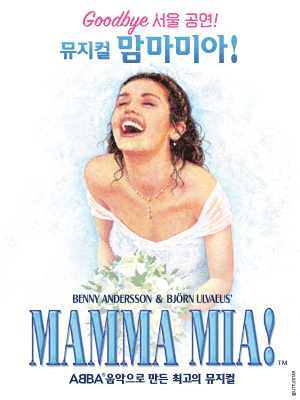
Mamma Mia!
I attended "Mamma Mia!" in the summer of 2023. Several friends had asked me to recommend a good musical, knowing how much I love the theater. Naturally, I suggested "The Phantom of the Opera," a show I had been fully immersed in for months. However, one friend mentioned she had already seen it in either Broadway or the West End and wanted to try something different. After some thought, I suggested "Mamma Mia!," since everyone would be familiar with ABBA’s songs.
I usually attend musicals alone or occasionally with my sons, so I was a bit apprehensive about whether this choice would satisfy my friends. After all, no one can guarantee both picking the right show and securing good seats that please everyone.
Choi Jung-won played Donna, Kim Hwan-hee was Sophie, Kim Young-joo took the role of Tanya, and Junmyun Park played Rosie. Tanya and Rosie’s exaggerated acting suited the show’s comedic tone. Unfortunately, Donna’s actor seemed to suffer from severe throat issues. At times, only a harsh breath could be heard instead of a solid vocal tone. High notes were often omitted, except during "The Winner Takes It All," where she appeared to gather every ounce of strength to deliver the song. However, as the performance continued, her condition worsened. I was surprised that no understudy or alternate had been arranged. Either the actor insisted on continuing, or the production team failed to schedule proper coverage. Since Donna carries the heaviest vocal load, it became a painful experience for both performer and audience.
Kim Hwan-hee, who had impressed me in "Rent" and "Kinky Boots," has a resonant vocal tone. Yet, to my friends — more accustomed to Agnetha Fältskog’s clear soprano — Kim’s voice sounded overly melodramatic. Personally, I believe that as long as an actor delivers a consistent portrayal with a matching voice, vocal color shouldn’t matter, nor does it need to imitate the original recording or actor. Still, for those familiar with ABBA, such differences are immediately noticeable and sometimes difficult to accept. This is one of the common challenges of jukebox musicals or revivals of classic songs.
What troubled me most, however, was the Korean translation of the lyrics. In some songs, I didn’t even realize they had begun until nearly ten seconds in, due to the drastic lyric changes. The iconic "I do, I do, I do, I do, I do, I do" was replaced by a plain Korean line at first, which made me uneasy — though thankfully, it returned in English later in the song. Clever original lyrics that rely on wordplay and rhyme are extremely difficult to translate, and in this case, no suitable Korean replacement for the repeated "I do" could be found.
The three dads were a cheerful bunch, and I particularly enjoyed Min Young-ki’s portrayal of Harry.
A humorous highlight came when Sophie asked about Sky’s whereabouts. Her friends replied that he was at Orpheus Bar on the mainland — a clever in-joke referencing Kim Hwan-hee’s previous role as Eurydice in "Hadestown.“
The stage was framed by bright, sparkling LED screens evoking the ocean, with manual set changes much like the Broadway production. Still, the stage felt small, and I thought it was a waste not to use the full space. When the music and performances are strong, I usually find myself fully immersed and don’t dwell on such things — but this time, I noticed.
Some popular actors appear in two or more productions at the same time due to the multicasting system, but dedicated understudies are uncommon. If a lead becomes ill, another cast member from the rotation must fill in. If no alternate can be found at short notice, the performance may be canceled or the sick actor proceeds despite their condition. While full refunds are usually provided, they cannot compensate for travel, accommodation costs, or most importantly, the lost time and experience.
The show ended with Donna and the Dynamos leading a finale performance. However, I couldn’t sing along except in the few moments where the original lyrics were preserved.
This production left me with much to reflect on.
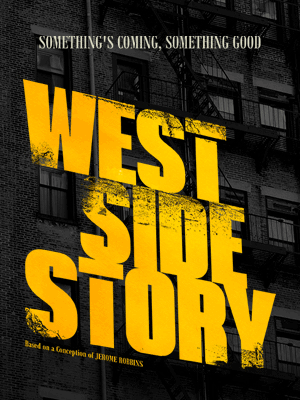
West Side Story
I attended the Korean production of West Side Story in 2023 with both excitement and a touch of apprehension. Tony is a romantic dreamer, a young man in search of a better life and love. From the very first lines, I was struck by the distinct resonance of Kang-hyun Park’s speaking voice, something I’ve always appreciated. When he sang "Something’s Coming," he surpassed even the polished YouTube recordings. It’s rare to hear a live performance outshine a studio version.
Being a long-time admirer of Leonard Bernstein’s music, I was especially anxious about iconic numbers like "Maria" and "Tonight." When you know the songs well, it raises the stakes for any live performance.
Park’s rendition of "Maria" reminded me of Aaron Tveit’s interpretation — clear, dramatic without excessive flair. He avoided over-stylization, singing with purity and emotional honesty. His lower register was rich and expansive, while the high notes were firm and resonant.
At times, even the quieter passages were delivered with such nuance that I felt new colors in music I thought I already knew well. His portrayal of Tony’s innocence and integrity aligned perfectly with both his vocal choices and acting.
The cultural translation of "West Side Story" to a Korean context is no easy feat. The life of immigrants and the discrimination they faced in 1950s New York is not something the average Korean audience would easily connect with. While viewers came expecting a modern "Romeo and Juliet," they were instead presented with complex social inequality, not just pride or rivalry between two houses.
The love story between Tony and Maria felt especially intense because it arose amidst tension, poverty, and youthful rebellion. In such a pressurized world, their bond felt like a lightning strike — fast, powerful, and inevitable.
The escalating conflict eventually drove Tony to desperation. His determination to stay close to Maria only grew stronger as tensions mounted. With Bernardo’s tragic fate, their love story was doomed. Tony’s death left Maria standing alone, but in that moment, forgiveness and compassion began.
The production ended with Tony and Maria running hand in hand to a more beautiful, conflict-free place, offering the audience a glimpse of hope amidst the tragedy.
The strongest element of "West Side Story" remains the music. Every number composed by Leonard Bernstein was a masterpiece of melody and orchestral harmony.
From "Something’s Coming" to "Maria," "Tonight," "America," "I Feel Pretty," "Somewhere," and "Mambo," the entire score stands as one of the most beautiful collections in musical theater history. These songs are regularly performed in concerts and continue to captivate audiences across generations.
The orchestra was excellent, preserving the rich textures and emotional nuances of Bernstein’s score.
For me, this production also carried a special personal connection. I had attended Leonard Bernstein’s only documented performance in Korea, when he conducted the New York Philharmonic in Seoul in 1979 at the Sejong Center for the Performing Arts. That concert left a deep impression on me, and hearing his compositions brought to life again in this musical added an extra layer of meaning.
The choreography was superb, reflecting the bold, athletic style that defines the original Broadway production. However, I noticed that while the individual ensemble dancers were talented, they did not always synchronize perfectly. This is understandable, given the difficulty of such complex group choreography. The male ensemble number in particular was slightly off rhythmically.
While Kang-hyun Park’s Tony was outstanding, the production faced challenges with the role of Maria. This musical is, in many ways, Maria’s show more than Tony’s, as her vocal demands are greater and her emotional arc more intense. Both actors who portrayed Maria struggled with the high notes, which was surprising given the otherwise strong vocal performances in the show. It felt especially strange and disappointing because the orchestra and ensemble provided such a solid musical foundation.
One bright star was Kim So Hyang (Sophie Kim) as Anita. She brought vibrant energy to every scene and sang with both power and clarity. Her dancing, especially her joyful performance at the curtain call, was infectious. Kim had previously performed on Broadway, and her experience clearly showed.
Despite the vocal challenges for Maria and some synchronization issues in the ensemble, the production delivered a heartfelt, musically rich rendition of "West Side Story.“
Kang-hyun Park’s Tony exceeded expectations, offering a fresh yet faithful portrayal that balanced innocence, passion, and tragedy. His ability to adapt vocal tone throughout the emotional journey — from optimism to sorrow — was masterful.
Above all, this production reminded me that even when cultural specifics may not fully translate, the core human experiences of love, prejudice, rebellion, and forgiveness remain universal.
"West Side Story" continues to resonate because of its powerful music, timeless themes, and the dedication of performers who bring these stories to life.
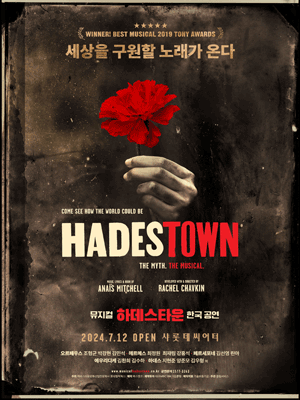
Hadestown
I first attended Hadestown in Korea in 2021, before I knew much about Kang-hyun Park. Even then, his voice stood out as beautiful, clear, and emotionally powerful. At the time, I did not fully notice the staging choices surrounding Eurydice’s descent.
By 2023, after experiencing the Broadway version, I returned to the Korean production. I sat in a similar position to my Broadway seat, the first row of the second-floor balcony, and noticed how much was lost without the visual of a true descent. Without that Broadway experience, I might not have realized how essential the downward motion is to the emotional clarity of Eurydice’s journey.
The Korean production, while following the licensed staging, had notable differences. The sunken center entrance was absent. A space beneath Hades’ office, where the drums are located in the Broadway version, opened upward to simulate descent. Because this area was raised above the main stage, Eurydice had to climb upward to go "down." This directional contradiction instinctively felt wrong and weakened the symbolic power of her journey. While spatial and technical limitations likely prevented replicating Broadway’s trapdoor, I believed that even a small lift for Eurydice alone would not have posed a major technical challenge and could have greatly enhanced the implicit storytelling.
The visible drums were also absent. The Fates pantomimed playing instruments, likely because casting singers who could also play was impractical for a short run. This choice, while understandable, felt artificial.
I attended three performances with Kang-hyun Park and one with Kim Minseok (a member of Melomance) as Orpheus in 2023. Kang-hyun Park’s voice was exceptional, with strength, clarity, and brilliant resonance. His falsetto maintained clarity and power without thinning, a rare quality. He dramatized the vocal arcs in “Wait for Me” beautifully and had improved his guitar playing from earlier years. His series of "Epic" songs was solid throughout the run, though one performance did have a slight pitch issue — a small imperfection in an otherwise outstanding portrayal.
Kim Minseok brought a thicker tone sung more in head voice, with stable, clear vocals. His interpretation had a dreamy, almost detached quality that avoided melodrama. He also played the guitar very well, complementing his vocal delivery and adding authenticity to his portrayal.
Eurydice was played by Kim Hwan-hee and Kim Soo-ha. Both offered strong, clear voices and emotional honesty. I thought they might have been cast in part for their vocal similarities to Eva Noblezada. Their hairstyles also reflected a shift: in 2021, both had straight cuts with bangs, similar to Noblezada’s style at the time. By 2023, after Eva’s departure from Broadway, the Korean production changed Eurydice’s look to long curly hair, signaling a subtle move toward differentiating the character. Kim Soo-ha also demonstrated rhythmic precision and strong dance skills.
Hermes delivered lines in a narrative style. While I personally prefer the rhythmic, almost rap-like delivery used in the Broadway production, the Korean Hermes provided a steady, guiding presence. Among the three actors, I especially appreciated Kang Hong Seok’s performance. He danced and remained engaged even when standing in the darker areas of the stage, showing clear dedication. He is a good dancer with excellent rhythmic diction and avoided overly dramatic or excessive gestures, which suited the role perfectly.
Hades, played by Kim Woo Hyung, impressed with a thick, resonant lower range and a bright, clear mid-range. I had attended his performances before, particularly his Javert in Les Misérables. I believe his natural range is bass, which made him especially well-suited for Hades. His voice provided the deep, thick tone required for the character while maintaining clear diction, essential for delivering Hades’ authoritative and commanding lines.
Persephone rotated between Kim Sun-young and Lina. Both sang well. Kim Sun-young played the role with a looser, slightly more tipsy portrayal, which suited the character’s carefree, wine-loving spirit. Lina, formerly of the K-pop idol girl group The Grace (천상지희, 天上智喜, SM Entertainment), danced very well — no surprise given her K-pop background — and was genuinely charming in her drunk scenes. When she cheerfully asked, "Wanna have a drink?" at the end, I honestly wanted to say yes.
The underground workers did their job and harmonized well. I felt that the ensemble numbers and chorus closely resembled the Broadway production. At the end, the workers removed their hats to symbolize liberation, but since they wore black, close-fitting hats and male workers had short black hair underneath, the visual change was minimal and went largely unnoticed.
One significant issue was the brass section, especially the trombone. At the beginning of each performance, the trombone opened with a clear, steady tone. Yet even then, I sensed slight tuning inconsistencies, likely from slide placement or timing issues. As the performance continued, the tone lost power, and the trombone began producing weak, indefinite, and occasionally off-tune sounds. Since the trombone is not just accompaniment but the foundation of the musical’s distinctive folk-jazz sound and adds dramatic weight to key moments, this was a serious flaw. While the production understandably made compromises in casting and staging, the brass performance should have met a higher standard.
As with many licensed productions, translation limitations were unavoidable. The clever Broadway pun when Orpheus says, "I also play the lyre," and Eurydice replies, "Oh, a liar and a player too!" could not be effectively translated. The wordplay, based on the homophone "lyre" and "liar," simply has no equivalent in Korean. Similarly, the recurring phrase "six feet under," which references both burial depth and the theme of death, was not fully translated, reducing its impact.
Despite staging and translation challenges and the noticeable issue with the brass, the Korean production of Hadestown succeeded in delivering a passionate, vocally excellent performance. Kang-hyun Park’s Orpheus was among the finest portrayals I have seen. His clarity, emotional nuance, falsetto control, and improved guitar playing created a performance that resonated deeply. For the first show I attended in 2024, I had returned just two days earlier from a business trip that involved a major day-night time shift. Even after traveling, fighting jet lag, and struggling with drowsiness, the moment Park Kang-hyun began singing, my fatigue vanished. His voice did not just bring springtime — it woke me completely.

Billy Elliot
I attended the Broadway production of Billy Elliot sometime around 2008–2010 and was deeply moved. When the Korean licensed production opened in 2017, I went with my two sons, firmly believing they should share this experience.
From whispers in the audience, I gathered that we were watching the youngest Billy in the cast. Sung Ji-hwan, as the youngest of the four Korean Billys, displayed astonishing dance and acting ability, precise diction, and a well-trained singing voice. He was such a small boy that he almost seemed suited to play the “small boy” character who opens the show, making his talents all the more striking. His tap dancing and ballet even surpassed what I remembered from the Broadway Billy, and his “Angry Dance” left a lasting impression. His “Electricity,” with clear diction followed by striking ballet movement, was especially touching — providing an emotional arc and a turning point in the musical.
The Korean production closely mirrored the Broadway version. The miners looked authentic, their hopeless hope resonating as they supported a neighbor’s child and returned to the mines, defeated. Mrs. Wilkinson was played by Choi Jung-won, who captured the spirit of a local ballet teacher you might find in any small Korean city. Tony’s song, He Could Be a Star, also left an emotional mark, reminding me that he, too, was still young and had dreams of his own.
Korea has mining towns that closed down due to environmental concerns, making the themes deeply relatable. The Korean performers brought exceptional dance and vocal talent to the production, and the young Billys demonstrated a level of performance that reflected the country’s high expectations for musical theater.
One of my sons was so moved that he returned to see it again with friends. He later told me that a Korean TV show had aired the audition process for the Billys, and all of them were remarkably talented.
I remember Deep Into the Ground, where Billy’s father, Jackie Elliot, shared his own story, and The Letter (Reprise), where Billy’s mother and Billy held the acceptance letter, promising that he would be himself and move forward. I admit, however, that I did not recall Merry Christmas Maggie Thatcher at all.
I never forgot either Billy — in Korea or on Broadway. It is always special to watch young actors excel in such big musicals. I hoped they enjoyed the experience without being overwhelmed or overburdened, finding valuable insights in their lives, just as Billy’s first dance symbolized in the musical.
I also later discovered that Min Chul Jeon, now a soloist at the Mariinsky Ballet, had once been among seven Billy candidates but had to step aside after outgrowing the height requirement. It was a small but touching surprise — another reminder that the dreams we witness onstage often continue in unexpected ways.
bottom of page

